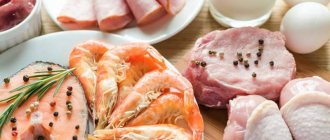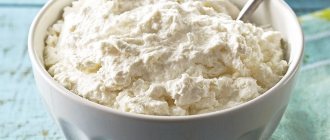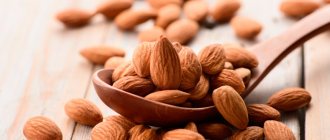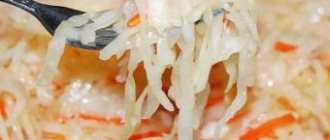Is it possible to eat at night?
Food is a source of energy and provides the body with the materials necessary for the construction of tissues. The products contain easily digestible carbohydrates, which are quickly absorbed into the blood and lead to an increase in glucose levels.
If a person moves actively after eating, all the sugar received by the body is absorbed by the muscles. At the same time, most people who are forced to spend the whole day at work do not pay any attention to their diet. In the mornings there is a catastrophic lack of time for breakfast or there is simply no appetite; during the day you snack on unhealthy sandwiches. And you can only eat well in the evening, but few people know what consequences a late dinner can lead to.
You can eat something, but there is a list of foods that are strictly prohibited before bed - for example, carbohydrates. It is they that provoke the onset of insulin production and send a signal to the brain that it needs to burn sugar or fat.
But during sleep, the body simply stops burning incoming fats and does not produce the hormone responsible for the development and growth of muscle mass. These factors lead to the onset of premature aging of the body.
During sleep, muscles do not process sugar; as a result, glucose enters the liver, after which enzymes convert it into fat. Then it spreads throughout the body, settling in different organs. As a result, the following pathologies develop:
- diabetes;
- hypertension;
- atherosclerosis;
- obesity of internal organs.
The moment you sleep, the duodenum stops producing useful substances that allow food to move through the gastrointestinal tract. Consequently, dinner remains in it until the morning, but the work of other organs begins, having received a signal about the arrival of food.
The pancreas begins to produce enzymes that break down proteins, fats and carbohydrates. The gallbladder releases bile, necessary for digesting food, which cannot pass through the duodenum, because it does not contract during sleep. As a result, the bile remains in the gallbladder, begins to thicken and after a while turns into stones.
If there is a violation of the correct digestive process, the formation of fermentative putrefactive processes begins in the intestines, provoking intoxication of the body and the development of allergies. As a result, all decay products are not only absorbed into the blood, but also distributed throughout the body.
Why is it harmful to eat at night?
Let's consider the main reasons for the negative impact of late-night dinners on the body:
- Constantly eating at night provokes the appearance of excess fat deposits, because all the calories that enter the body are simply not processed and begin to accumulate. Which leads to the inevitable appearance of excess weight.
- During sleep, all processes occurring in the body slow down, including digestion. Consequently, food eaten before bed is not digested and a disruption of healthy microflora is provoked, which negatively affects health.
- At night, natural restoration of the body should occur, but with health benefits this process is only possible on an empty stomach. Give your body time to recover and gain energy at night.
- According to scientists, it is on an empty stomach that the body begins to activate processes that prevent aging. During the day, this protective quality simply stops working, not only due to food intake, but also being in stressful situations.
- It is very difficult to fall asleep after a heavy dinner, because on a full stomach the body does not produce melatonin (the hormone that induces sleep). In this case, sleep after eating will be very restless, and in the morning you will not be able to feel completely rested and full of energy.
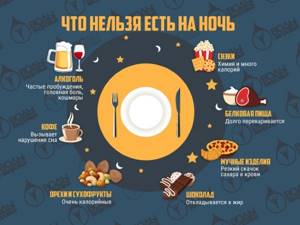
It is not recommended for small children and people suffering from stomach ulcers to sleep on an empty stomach.
Turkey
Turkey is high in protein, with nearly 8 grams of protein per 28-gram serving when roasted. This element is important for maintaining muscle tone and regulating appetite. Turkey also contains vitamins and minerals, such as riboflavin, selenium and phosphorus.
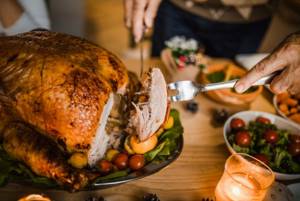
Photo: istockphoto.com
Some people feel tired or even sleepy after eating a hearty turkey meal. This happens because it contains the amino acid tryptophan, which increases the production of melatonin, the sleep hormone.
The large amount of protein in meat can also cause mild fatigue. Some studies suggest that consuming moderate amounts of protein before bed leads to better sleep quality—among other things, sleeping more deeply and waking up less frequently during the night.
What foods are prohibited before bedtime?
To avoid serious health problems and curb your appetite a little in the evening, you can eat healthy foods. But it is worth knowing the list of prohibited products:
- sweets, pastries, chocolate - these products have a stimulating effect on the nervous system;
- foods high in fiber can lead to upset stomach and bloating;
- eggs, dairy products, seafood;
- Any legume products, which can be an excellent breakfast, are absolutely not suitable for an evening meal;
- meat, but the exception is boiled chicken breast and only if it was a hard day when the body received high physical activity;
- spicy food does great harm to the body and can increase appetite, so it is absolutely not suitable for dinner;
- fatty foods can provoke the development of various diseases of the gastrointestinal tract, which quickly become chronic and lead to excess fat deposits;
- Drinks containing large amounts of caffeine lead to the development of insomnia and excess weight.
Before going to bed, it is not recommended to consume various sweets and carbohydrates, because during sleep the body rests and simply cannot process the food received. Leftover food turns into fat deposits. Also, sweets sharply increase the level of glucose in the blood, therefore, an influx of energy, which is consumed very quickly. Such jumps negatively affect the quality of sleep.
Read more: why you want sweets and what your body lacks.
Low-fat fish
Despite the fact that these products have a significant positive effect on the body as a whole, they do not burden the gastrointestinal tract at all. Lean fish contains protein, which is beneficial for human muscles. This is important in the context of the fact that in order to lose weight it is necessary to give the body physical activity. This way you will have enough strength for training and will not have extra calories. Low-fat varieties of fish for the diet are rich in minerals, strengthen and cleanse blood vessels, balance high blood pressure and improve human well-being.
How can a late dinner be done without harm?
If you feel very hungry, you can have dinner using foods that will not cause much harm to your health:
- If you are worried about a strong feeling of hunger before going to bed, you can eat some walnuts, half an apple, but only without the peel, or a pear. An excellent snack would be a ripe avocado, a slice of melon, a tomato, low-fat yogurt or cabbage.
- For a late dinner, you can make an omelette with broccoli, but only from proteins alone.
- A few hours before bedtime, you can also have a slightly high-calorie snack - boiled carrots, beets and potatoes, half a banana.
- If there are no stomach problems, apples, mushrooms and legumes are allowed, but only in limited quantities.
- Berries are allowed, kefir with minimal fat content and fiber can be present in the diet in the evening only in small quantities.
Nutritionists say that kefir both during the day and before bed is of great benefit. It is very nutritious and contains virtually no calories, so you can satisfy your hunger without harm to your health.
To lose excess weight, kefir should have zero fat content. This fermented milk drink does not contain carbohydrates or fats, but it does contain proteins, which make kefir easier to digest.
Before going to bed, you can drink one glass of kefir. Lactic acid bacteria normalize the intestinal microflora. It can be consumed every day, due to which it not only improves intestinal function, but also causes weight loss.

The process of weaning off late meals takes time, so you need to try to rebuild your diet and eat only healthy foods:
- boiled vegetables - beets, carrots, broccoli, cauliflower, eggplant, sweet bell pepper;
- fresh fruit juices, but not store-bought products, as they contain a large amount of sugar;
- fermented milk products - cheese, cottage cheese, milk and kefir, the fat content of which is not higher than 2.5%, eggs;
- purified mineral water – should not be consumed in large quantities, otherwise severe swelling will appear in the morning;
- lean meat - boiled beef, rabbit;
- herbal teas - with mint, chamomile, ginger, thyme, green;
- sea fish - dorado, black cod, white perch, halibut, sea bass;
- honey - in limited quantities;
- poultry meat – turkey, chicken breast;
- baked goods - bread with cereals and bran from dark wholemeal flour;
- seafood – octopus, squid;
- berries - cherries, blackberries, sweet cherries, blueberries or raspberries;
- nuts – walnuts, pine, hazelnuts, peanuts, almonds;
- cereals – oatmeal, rice;
- fruits - peaches, apricots, melon, persimmon, kiwi, pear, banana, apples.
What kind of fish is best to cook for a diet?
When losing weight, it is recommended to boil the following varieties: pollock, tuna, cod, haddock, flounder, you can eat shrimp and crabs. The rest of the fish for the diet should be cooked according to how much fat they contain. Boiling is the most correct method of preparing dietary food, while the meat becomes soft, tender, and green leaves and a couple of lemon juice will help to obtain an unforgettable aroma.
You can safely include fish soup in your menu; boiled pike contains many useful substances and can be consumed in any quantity. The broth is very flavorful and low in calories. To reduce the number of calories, it is recommended to avoid sauces that only whet your appetite. To enhance the smell of fish, soak it in a little milk before cooking.
How to break the habit of late-night snacking?
If you fill your stomach before bed, you will experience an unpleasant feeling of heaviness at night, as food simply is not digested and settles on the intestinal walls. The negative consequences of eating at night include the development of obesity, disruption of the functioning of the gastrointestinal tract, memory and blood circulation deteriorate, and insomnia develops.
To get rid of the habit of constantly overeating at night, you should follow a few tips from nutritionists:
- Try to walk for at least 60 minutes every night before going to bed. This will help calm the nervous system and set the body up for sleep.
- If you have problems with excess weight and you are trying to lose weight, hang a motivating photo on your refrigerator.
- Meditation or a bath with the addition of aromatic oils will help get rid of hunger.
- Before going to bed, try not to test yourself with harmful and high-calorie foods that provoke appetite just by their appearance.
- Replace a late dinner with a glass of kefir or milk with honey; herbal tea would be an excellent option.
- Try not to go to bed too late; the ideal option would be to go to bed 2-3 hours after your evening meal.
Is it possible to eat after 6 pm?
Why you can’t eat at night, we figured it out. But is it possible to have dinner after 6 pm? Many articles on diets say that it is better to refuse food after 18.00. However, this is not quite true. You should not eat later than 2-3 hours before going to bed.
If during the day a person is very tired and feels hungry, he can allow himself dinner after 6 pm (of course, keeping an eye on the total number of calories in the daily diet). Otherwise, it will be difficult to sleep due to hunger. In addition, strict diets with no food at a certain time cause stress, which will force the body in the future to try to put aside as many reserves as possible “for a rainy day,” that is, to switch to working in accumulation mode.

in most cases it is better to avoid eating after 6 pm
What are the consequences of eating at night?
Constant abuse of food before bed leads to the following consequences:
- insomnia develops, which can become chronic;
- the functioning of the gastrointestinal tract and the whole body is disrupted;
- intoxication of the body develops, which can be dangerous to health;
- excess fat deposits appear;
- brain activity is disrupted;
- memory deteriorates;
- the functioning of all internal organs and systems is disrupted.


